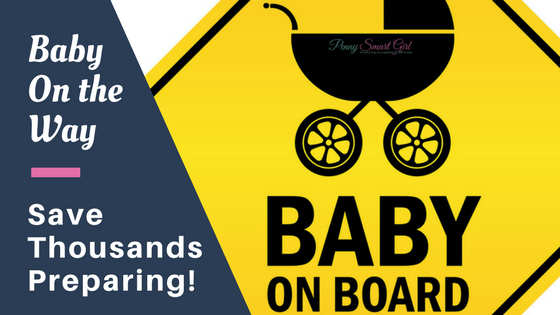 According to CDC’s National Center for Health Statistics, birth rates in the U.S. are rising. Bringing a new life into the family is an exciting event, but parents are also concerned about the financial obligations associated with the prenancy and birth. WebMD estimates prenatal care for those without insurance coverage can cost up to $2,000, and the delivery could run as high as $15,000.
According to CDC’s National Center for Health Statistics, birth rates in the U.S. are rising. Bringing a new life into the family is an exciting event, but parents are also concerned about the financial obligations associated with the prenancy and birth. WebMD estimates prenatal care for those without insurance coverage can cost up to $2,000, and the delivery could run as high as $15,000.
Fortunately, there are plenty of simple and effective ways to save on both the pregnancy and delivery, so we’ve covered just a few of the most popular strategies here. Share them with the expectant and new parents in your life.
Pregnancy & Preparation:
- Consumables — According to com, parents can count on spending close to $50 per week ($2,448 per year) on diapers, formula, and baby food alone. Other items like a daily prenatal vitamin for the mother-to-be can also add up. Prepare for these recurring expenses ahead of the birth by buying in bulk (Costco, Sam’s), on sale, and by starting early.
Example: Chris and Amy began buying a box of diapers and wipes per week after their first trimester of pregnancy to lessen the financial burden when the baby arrives.
Money-Saving Tip: Use strategies like those from The Thrifty Frugal Mom to combine sales with coupons to maximize savings.
- Showers and registries — Baby showers can be a great way to begin checking items off your list, so try to have at least one shower during the pregnancy. If you’re having multiple showers or a large number of guests, be sure to register for more things than you think you’ll need, even if they seem unnecessary. And hold off on buying anything yourself until after the showers are over to determine what’s still needed.
Example: Jess had three baby showers: one with family, one with friends, and one at work. She registered for more than she needed, but was able to return many of the items for nearly $200 in store credit she can apply toward diapers and baby food.
Caution: Return unwanted items promptly; merchants often put time limits on returns and exchanges. Also, while it may be tempting to register at an online retailer like Amazon, if you think you’ll return or replace a lot, the process will be much easier at local brick-and-mortar stores.
- Maternity clothing — Wait to purchase maternity clothes until you really need them and can better assess your Because you’ll only need maternity clothes for a matter of weeks, see if friends and family will share used items. Also, a belly band (a stretchy band worn around the waist) will allow you to wear your pre-pregnancy pants much longer. Sites like Swap.com or BellyGoRound are also great places to purchase and resell maternity clothes.
- Go easy on the lists — Remember that the goal of those retailer baby supply lists is to sell more stuff, so unless you’re registering for a shower and need to add more items, pump the brake
Caution: You probably don’t need the dozen baby bottles recommended by your favorite retailer, so buy the minimum and add more later. This can also be beneficial if your baby ends up not liking a specific brand or type of bottle, pacifier, etc.
- Gear up with used — Purchase gently used baby clothes, furniture, car seats, and other items through local resale shops or online sites like eBay: Baby, Craigslist, Freecycle, MyLittleClothesline, RockaBuyGear, StorkBrokers, or any of the sites at Mom365: Swap Sites.
- Newborn clothing — If you’d prefer new clothes, shop clearance racks and sales at stores like Carter’s, Old Navy, and Gap Boys and Girls. Remember that you’ll need increasing sizes as baby grows, so don’t buy everything in the newbie
Money-Saving Tip: Newborns won’t need all those adorable little shoes, so skip this expense and just buy booties to keep their little feet warm.
- Double-duty furniture — Look for furniture that can serve multiple purposes: cribs that can convert to toddler beds, highchairs that convert to booster seats or a regular chair, and a dresser combined with a changing pad on top instead of a standalone changing table. If you need a rocking chair, consider one you can use elsewhere in the house after the child is See more ideas for multipurpose baby items at SheKnows.com.
- Ask for samples — Doctor’s offices and maternity wards are inundated with free samples from manufacturers. During regular checkups and your hospital stay, ask for freebies and samples they may have on Remember, anything helps!
Money-Saving Tip: Look for discount coupons at RetailMeNot, CouponMom, CouponBug, and Coupons.com.
- E-mail lists and store clubs — Sign up for e-mail offers from baby food manufacturers and other sit Also, see if your local supermarkets or drug stores offer buying clubs for baby supplies. Amazon Mom offers 20% off on diapers if you use the Subscribe & Save option, but be sure to weigh the cost of a membership against the potential savings.
- Low-cost prenatal care — Text4baby provides critical health tips for a healthy pregnancy, including a list of handy hotline phone numbers. Go to gov: Low-Cost Community Care if you can’t afford a health plan or can’t qualify for low-cost health care at a nearby community health center. Also explore Medicaid and CHIP coverage and Health & Human Services: Maternal and Child Health for other resources that may be available.
Hospital & Delivery:
- Check insurance coverage — Don’t assume delivery, prenatal checkups, and tests are automatically For those with health insurance, doctor visits and diagnostic tests like ultrasounds will likely be covered (at least partially) as preventive care.
Caution: Ideally, know your provider’s policies before getting pregnant, ensure you’re covered for maternity, and be sure your preferred facilities and providers are in your network.
Money-Saving Tip: Call your insurance carrier to ask them if they provide lactation consulting or a free breast pump.
-

Pregnant Woman And Partner Having 4D Ultrasound Scan
Use non-hospital facilities — Save money by getting an ultrasound from a standalone medical facility rather than having it at a Talk with your insurance carrier or doctor about other cost-cutting options and which facilities are in your network.
Example: Mindy saved $100 per visit on her first few ultrasounds by using an independent women’s clinic. Before making the first appointment, she called to make sure the clinic was in her insurance network and that they’d transfer the records to her OBGYN.
Money-Saving Tip: Go to the Healthcare Bluebook (HBB) to find the lowest costs on facilities and doctors near you.
- Negotiate — Some doctors and hospitals will negotiate a “fair price” (as outlined in the HBB), offer discounts for cash payments up front or before you check out of the hospital, or reduce their standard fees once they learn some procedures may not be covered by
- Ask questions — Don’t go without necessary procedures, but if a doctor or hospital recommends something, ask why it’s needed, how much it will cost, and whether it’s covered by insu Many tests or lab work are routinely ordered without a specific reason to do so; these are costly expenses that could potentially be avoided.
- Share a room — Although many families would prefer a private room, sharing a room may provide a substantial cost reduction depending on the hospital and length of Call in advance to determine costs and if sharing a room is worth the savings.
- Request an audit — Audits can catch overcharges and mistakes on your hospital Duplications, billings to the wrong patient, coding errors, etc., can quickly add up to hundreds in avoidable expenses. Typically, there’s no cost to you for an audit, but you have to ask. Talk to your insurance provider, and see Fight Medical Billing Errors.
Example: Jason and Ashley saved nearly $80 by catching an upcharge on their audit where the hospital substituted name-brand medication for their requested generic.
- Lose the extras — Ask ahead of time what the hospital charges for extras, if there’s a daily charge to watch TV, and if they’ll allow you to bring your own over-the-counter medication, diapers, wipes, toiletries, etc.
- Take your own pics — Skip the photo/video service and have a friend or family member snap new baby Post them on any of the top free photo sharing sites or even start your own blog to share with family and friends.
We’ve covered just a few of the ways you can save during the pregnancy and delivery in this issue. Watch for an upcoming issue for dozens of resources and strategies to save during your baby’s first year.

